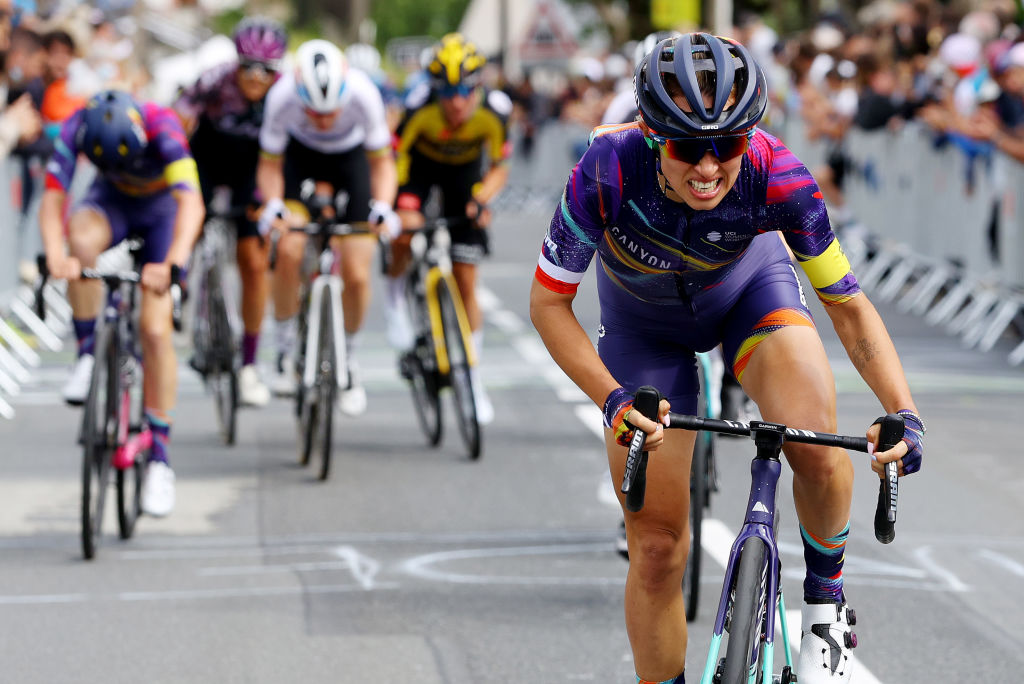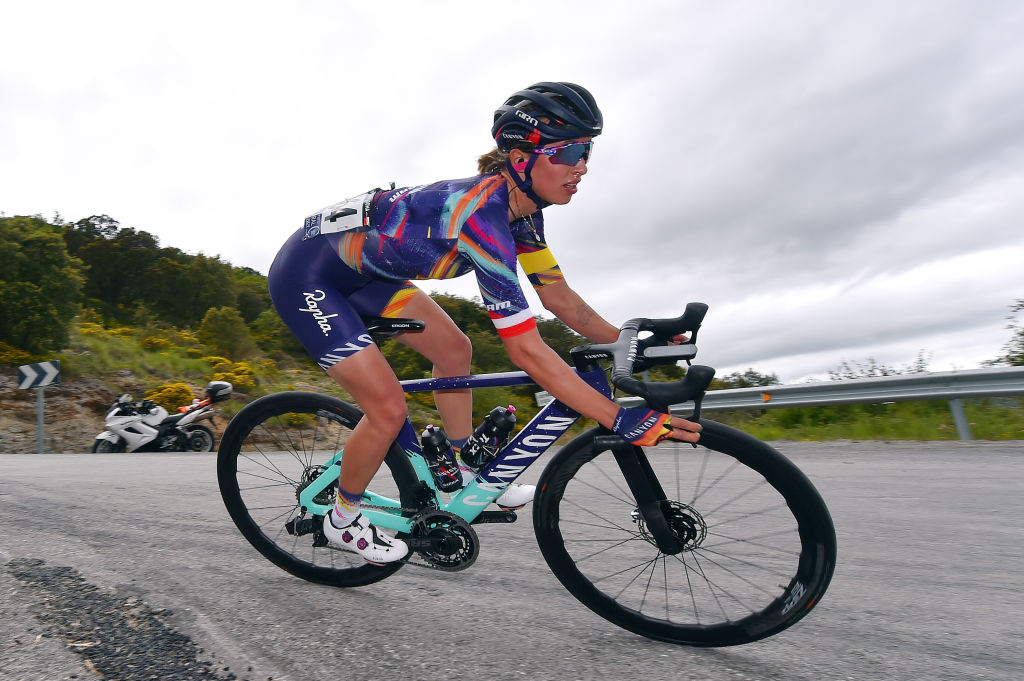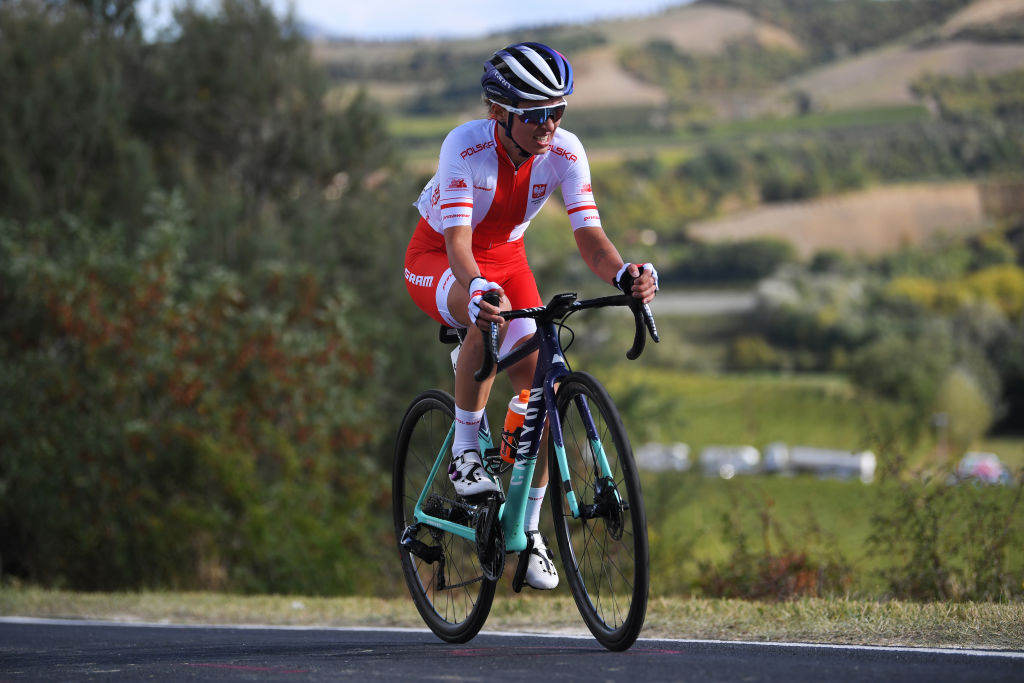Kasia Niewiadoma: Ready for anything at the Olympics
Polish contender on the importance of maturity, motivation and keeping it fresh ahead of her second career Games

Kasia Niewiadoma will put away her Canyon-SRAM kit in exchange for the red and white colours of her Polish national team as she heads into her second career participation at the Olympic Games in Tokyo.
She was just 22 years old when she first competed at the 2016 Olympic Games in Rio de Janeiro. In an interview with Cyclingnews, Niewiadoma said that a lot has changed in the five intervening years and that maturity, as well as feeling refreshed and motivated, will go a long way as she pursues a medal in the elite women's road race in Tokyo.
"As a person, I am a different human being now. I was only 22 in Rio and naive, listened too much to what others were saying about me, and took things personally," Niewiadoma told Cyclingnews in a phone interview before boarding a flight to Warsaw to meet her national team ahead of her connection to Tokyo.
"When I did interviews, [the press] told me that I would get a medal in Rio. It was a statement, not a question. I remember feeling a huge amount of pressure and fear of everything.
"Now I know that there are two scenarios - success or failure - and both of those scenarios are OK. I will not die if I don't win a race. I'm calmer and more mature. Maturity helps when it comes to major events.
"Physically, I feel more prepared. I did my final Tokyo simulation, and I felt that everything was good and that the hard work was done. I know that physically, I am there, and now we have 10 days to rest and keep everything as it is. I need to try to deliver it. I'm ready, hungry for racing and winning. Anything is possible, and I dream about the big results."
Keeping it fresh
Niewiadoma made a personal decision to change her calendar and skip the recent 10-day and mountainous Giro d'Italia Donne. Instead, she raced the shorter five-stage Baloise Belgium Tour, where she was a support rider for her Canyon-SRAM teammate and overall winner Lisa Klein.
Get The Leadout Newsletter
The latest race content, interviews, features, reviews and expert buying guides, direct to your inbox!
She finished eighth overall but said that the higher speeds of the flatter stages offered her a chance to build top-end form and not get too bogged down as she may have been at the Giro. She also said that not having the pressure to perform as a team leader offered a fresh perspective.
"I feel refreshed, or just fresh, for this time of the season. For the last seven years, when I was racing in the Giro, I could feel that I was destroyed toward the end of that race. It would take me so long to recover from that huge effort physically. I'm not the type of rider who deals well with high temperatures, too, so it was an extra factor that would smash me down," Niewiadoma said.
"Taking the opportunity to skip the Giro, and take a different path to prepare for the big goal of my career [Olympic Games] was very refreshing for my mind. In Belgium, we were racing on flat roads, sprinting for three hours straight with so many attacks, and the racing was super fast. I had been climbing for the last few months, and gaining speed in my legs improved my form. I couldn't get that on my training rides.
"Being in a position to ride for a teammate was also very refreshing, and I loved being in the position to not think about my personal result. I got to ride for someone else and pay [my teammates] back for all the hard work they do for me. It was a very nice experience, and I'm happy with that decision that I made to change my calendar."

Niewiadoma has been one of the top riders globally since she graduated from the junior ranks and took her first pro contract as a trainee for Rabobank in 2013. Her calendar remains largely unchanged each season, primarily focusing on the Spring Classics, the Ardennes Classics, and the Giro d'Italia Donne.
She kept much of her early-season schedule the same. Aggressive performances saw her finish ninth at Strade Bianche, fourth at Trofeo Alfredo Binda, second at Dwars door Vlaanderen and Flèche Wallonne, fourth at Liège-Bastogne-Liège, 10th at Vuelta a Burgos and sixth at La Course.
She said that competing in the same races year-in and year-out can affect an athlete's motivation levels and that even one minor tweak to her annual calendar was enough to spark pure motivation.
"It's important [to keep racing fresh]. When you're a young professional, everything is new and exciting. Season-after-season, you need an extra kick to get motivated. We all say that we are motivated, but when you do something over and over again, you have to dig deep for that pure motivation. Having a small change helps. Even skipping one race, for me, allowed me to focus on what I wanted," Niewiadoma said.
"Everyone is physically amazing right now, and strong, because it's an Olympic year, so it's all about the mental power now, and how you deal with certain events and pressures. That small percentage matters."
Removing distractions
Niewiadoma arrived in Tokyo a week ahead of the elite women's road race on July 25. She said that she's not sure what to expect but that she's prepared for a scenario that includes limited time outside of her designated national team hotel due to the COVID-19 restrictions and protocols.
"I've heard so many different scenarios that I decided to stay calm and see what happens once I arrive there. There's no point in spending time in front of the computer trying to find out what will happen because it's still so unclear. I'm prepared for being stuck in the hotel room. All the hard work is done now, so all I need to do is rest and maintain my fitness," Niewiadoma said.
"I'm not going to Tokyo thinking that I still need to train there. I need to make sure that I'm recovered after the travel and that my body isn't so tired from sitting for so long, and try to keep everything else as it is."

Niewiadoma said that the experience of being at a sporting event like the Olympic Games would feel different in Tokyo compared to her first participation in Rio. This time, there will be limitations on traveling outside of team hotels. There won't be an athletes' village, which Niewiadoma said amounts to a lot of walking and a distraction from the racing.
"When I think about Rio, it was amazing to experience the Olympic Games as a person. As an athlete, it was overwhelming and I felt distracted and I forgot what I came for," she said.
"The village was huge. When cyclists prepare for races, we try to limit time on our feet, and we don't want to walk, we want to rest. I remember thinking that I had never walked as much as I did a couple of days before the road race at the Olympic Games. We walked everywhere all the time, and it made me feel like I was a holiday rather than about to race the most important race of my life.
"Personally, I'm happy that we will stay in the hotel. It makes me feel calmer because it will be the same as what I experience at every other race in the year."
On Dutch terms
One of the focal points of the peloton competing in the elite women's road race is the powerful four-rider Dutch team that includes defending champion Anna van der Breggen, Annemiek van Vleuten, Marianne Vos and Demi Vollering.
Niewiadoma is often racing against those four riders throughout the season and understands their collective strength. She believes that the Dutch team will set the tone for the race but hopes other nations will be strong enough to disrupt their plans.
"It's difficult because Holland has four riders who can win. We have no choice but to try to challenge them. We need to focus on our strong points and use them in a way that we can create a perfect scenario for our team," said Niewiadoma, who will line up with two teammates in Anna Plichta and Marta Lach.
The elite women's 137km road race will start from Musashinonomori Park and end at the Fuji International Speedway. The women's course will not go over Mt. Fuji like the men's but will include climbs over Donushi Road and Kagosaka Pass, and there will be 2,692 metres of elevation gain.
Niewiadoma anticipates a challenging race where a selection could be made over the mid-race climbs before the peloton reaches the Ardennes-like final.
"The race will be hard from the beginning, and so it won't all come down to the last hour. It's not a circuit, but point A to B. The final is similar to the Ardennes, but we face 40km worth of climbing before that. To get to that Ardennes way of racing, we will need to suffer hard before that," Niewiadoma said.
"I believe that the Dutch team will try to set the pace on the climbs to reduce the peloton, to drop everyone and be at the top of the climb with just four Dutchies. I believe that the race will be raced in terms of how the Dutch team wants to do it, but I hope that there will be more nations that can mess up their plan."
Niewiadoma finished sixth place at the Olympic Games in Rio, but she believes that she is more prepared to handle the pressure, the course and the peloton this time around.
"I believe that I can medal. I feel that I'm strong enough to do that. I need to stay calm, which is the only thing that stops me from getting a good result. All I want to do is stay calm and relaxed. During the race, anything could happen. You might have the greatest legs of your life," Niewiadoma said.
"My ultimate goal is to do my best and to finish the race knowing that I could not have done anything better."

Kirsten Frattini is the Deputy Editor of Cyclingnews, overseeing the global racing content plan.
Kirsten has a background in Kinesiology and Health Science. She has been involved in cycling from the community and grassroots level to professional cycling's biggest races, reporting on the WorldTour, Spring Classics, Tours de France, World Championships and Olympic Games.
She began her sports journalism career with Cyclingnews as a North American Correspondent in 2006. In 2018, Kirsten became Women's Editor – overseeing the content strategy, race coverage and growth of women's professional cycling – before becoming Deputy Editor in 2023.